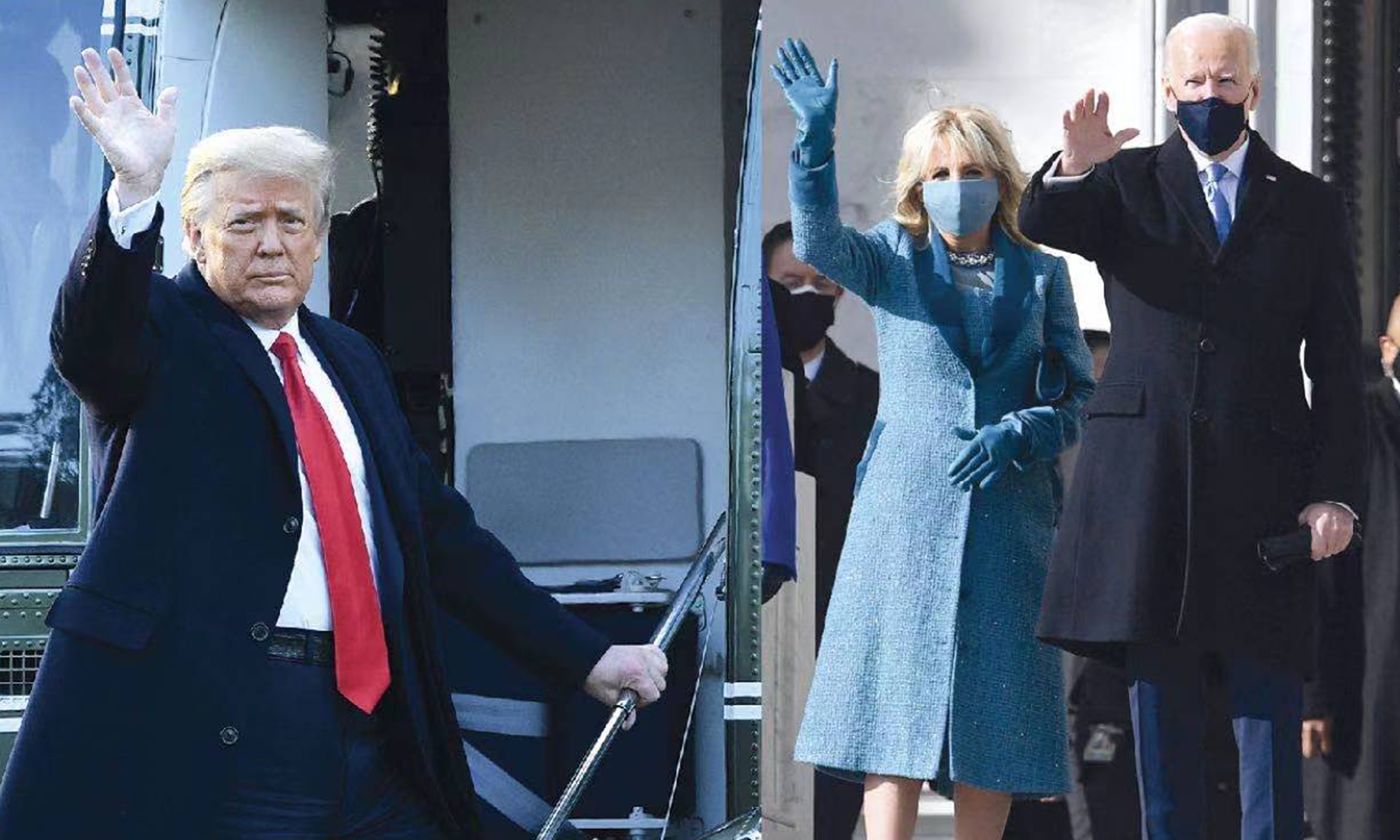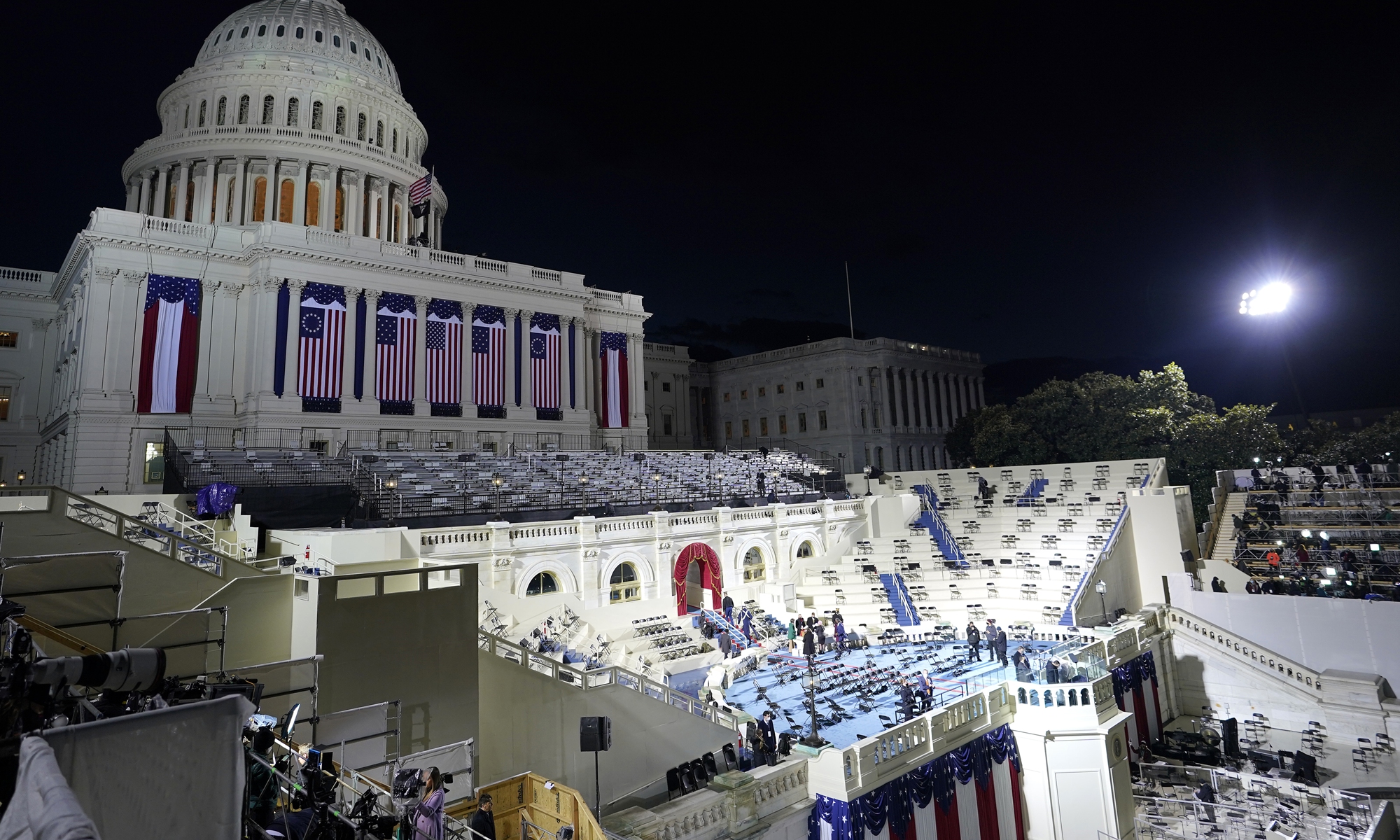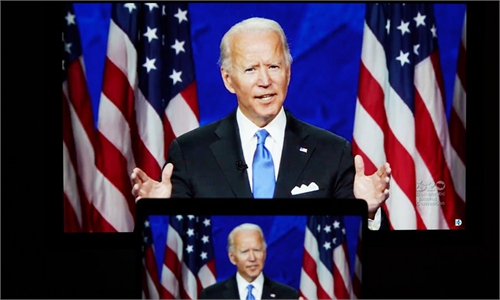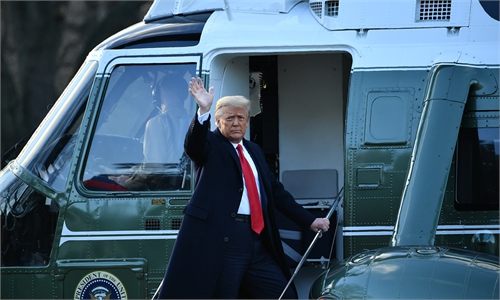
Outgoing US president Donald Trump waves as he boards Marine One at the White House in Washington, DC, on Wednesday. Trump traveled to his Mar-a-Lago golf club residence in Palm Beach, Florida, and did not attend the inauguration for president-elect Joe Biden. President Joe Biden and First Lady Jill Biden arrive for his inauguration as the 46th US president, on Wednesday at the US Capitol in Washington, DC. Photos: AFP
In his remarks in his farewell address, released on a pre-recorded video on Tuesday, the last full day of his presidency, Trump hailed his hostile policies toward China as an achievement. He continued to play the blame game and used a racial term to cover his failed handling of the COVID-19 epidemic that has killed more than 400,000 Americans. He wants to transmit his hostile China policies to next administration on the day of power transition.
"We imposed historic and monumental tariffs on China; made a great new deal with China. But before the ink was even dry, we and the whole world got hit with the China virus," Trump said, full of hostility toward China. "We revitalized our alliances and rallied the nations of the world to stand up to China like never before."
Chinese analysts said this shows that Trump and conservative anti-China forces in the US want the new administration to inherit and continue the tough strategy toward China. It is likely, they said, that although the two parties in the US have many differences, they share common ground when it comes to being tough on China.
According to US media reports, key members in Biden's team who were nominated to lead crucial departments, including secretary of state pick Antony Blinken, defense secretary pick Lloyd Austin, and Janet Yellen, nominee for treasury secretary, all said during their confirmation hearings at the Congress that China is the top strategic competitor to the US, and the new administration would continue some of Trump's hard-line policies toward China.
Jin Canrong, associate dean of the School of International Studies at the Renmin University of China, told the Global Times on Wednesday that this kind of attitude will not surprise Chinese leaders and experts on China-US ties at all.
"We have never had any wishful thinking to expect the Biden administration to fundamentally change the policies toward China," Jin said.
Blinken said at his hearing on Tuesday that "President Trump was right in taking a tougher approach to China." He noted that "I disagree very much with the way that he went about it in a number of areas, but the basic principle was the right one, and I think that's actually helpful to our foreign policy."
Lü Xiang, an expert of US studies with the Chinese Academy of Social Sciences in Beijing, told the Global Times on Wednesday that Blinken and other nominees were speaking to Congress, so they needed to please the different political forces to maximize support for their nominations.
"So the remarks they made are not entirely equal to the policies they would make after they take the office. They will and must make adjustments to Trump's policies, even if they have to agree that being tough on China is correct, because the atmosphere toward China at the moment is poisoned," Lü said.
Since 2018, the Trump administration has activated a "whole-of-government approach" to deal with China, and it has tried everything short of actual war to confront China, including a trade war, ideological struggles, sanctions against high-tech firms, propaganda and stigmatization, military pressure and support of separatists and secessionists to harm China's sovereignty.
But the result of all these efforts have not had as much impact as desired, as the approach did not stop China's development nor did it impact China's export sector a great deal. As China turns out to be the only major economy to have posted positive economic growth in 2020, many US companies and consumers have paid a heavy price due to the unwise decisions made by the Trump administration, Jin said.
"So as long as Biden's team is not stupid like Trump's team, there will be some changes in tactics," Jin noted.

Workers prepare for the inauguration of US president-elect Joe Biden on the West Front of the US Capitol on Wednesday in Washington, DC. During the inauguration ceremony Joe Biden becomes the 46th president of the US. Photo: AFP
Competition by rules
Li Haidong, a professor at the Institute of International Relations of China Foreign Affairs University, said the US competition with China, led by Trump's team, had no rules and bottom line. Trump is a leader who does not care about US national interests and the benefits of Wall Street and American companies, and he only pays lip service to international norms. He can even accept "lose-lose" consequences with not just China, but also the EU and other US partners.
"Biden's team offered some tough words during the hearings, but they will be very pragmatic in reality, as they are experienced and know the boundaries and rules of the game with China," Li said, noting that the new US government's strategy toward China is more manageable rather than outright confrontational. Their most pressing challenges are domestic, including economic recovery and fighting COVID-19, but not China.
Lü said Biden will have the final say on US policies toward China, and the expressions of his team members at this moment cannot fully represent Biden's ideas. Biden will handle China-US relations based on his rich diplomatic experiences.
If conservative forces and Biden's team want to shape the new president as "another Trump with better table manners," then "the US will be doomed," Lü noted, adding that the US mistakenly painted China as its biggest threat. They spent too much energy on attempting to contain China while ignoring real problems like the pandemic and economic challenges.
"If the US continues to expend its political capital and economic resources on major power competitions, it will walk along the same path as the former Soviet Union [which disintegrated]," Lü said.
Icebreaking?
China has the sincerity to restart dialogue and cooperation with the US now that Biden has taken office. Chinese analysts said the most possible fields for icebreaking would be climate change, fighting COVID-19, and trade.
Jin said that after Biden was confirmed president-elect in December 2020, some Chinese governmental departments already "started to engage with Biden's team and propose plans for dialogue. This has proved China's sincerity. As long as there is even 1 percent possibility to improve bilateral ties, China will make 100 percent efforts to push it forward."
Douglas H. Paal, vice president for studies at the Carnegie Endowment for International Peace, told the Global Times, "I would not look for breakthroughs or announcements beyond what have already been signaled" during the first 100 days of Biden's presidency, but that the channels of communication will be normalized.
This would help ease the tension in the US-China relationship, and help both sides to get back to the business of "working on the practical problems," and find ways to reduce the potential for conflict, Paal said.
A meeting between the two countries' leaders is unlikely any time soon but at the level of state and defense secretaries, senior officials on both sides can start communicating to learn the expectations, bottom line and strategic ambitions of each other, Paal said, noting that there is a key indicator for observing the bilateral ties in the first 100 days - who will be appointed as new US ambassador to China, and will China accept the ambassador picked by Biden.
The most likely field for icebreaking would be climate change, Jin said, because in fighting the pandemic, the US has a high opinion of its capabilities. The Biden administration would feel embarrassed and ashamed to ask for help from China, even though China is willing to offer assistance in this regard. For economic and trade cooperation, as the US stock market is stable now, he has no pressure to adjust trade policy immediately.
Lü said the tariffs and bans on American firms to supply Chinese sci-tech companies are also harming the interests of ordinary consumers and companies in the US, especially under the pandemic. Therefore, it would be unnecessary for Biden to inherit such self-injuring policies, so China-US relations could also be reactivated in the fields of economy and trade.
According to a survey conducted by the Global Times poll center covering nearly 2,000 participants across China in December 2020, which asked "in what fields can China boost cooperation with the US after Biden takes office," 48.7 percent chose fighting the COVID-19 pandemic, 44.4 percent chose economy and trade, 39.9 percent chose combating climate change, but only 12.1 percent thought that "the two countries will not strengthen cooperation."
During the first 100 days of Biden's presidency, the new government must show some sincerity to solve some remaining problems between the two countries like unreasonable tariffs and the illegal detention in Canada of Meng Wanzhou, CFO of Chinese IT giant Huawei. These will not be difficult problems to solve, as Biden could sign some new executive orders to correct the absurd executive orders Trump had signed, said Chinese analysts.
"We are not sure what Biden will do in his first 100 days, but we can say he must make some progress on these issues. If he wants to use Trump's legacies as bargaining chips to pressure China on the negotiating table, the US will pay a heavier price," Lü noted, "We believe Biden is smarter than Trump."





